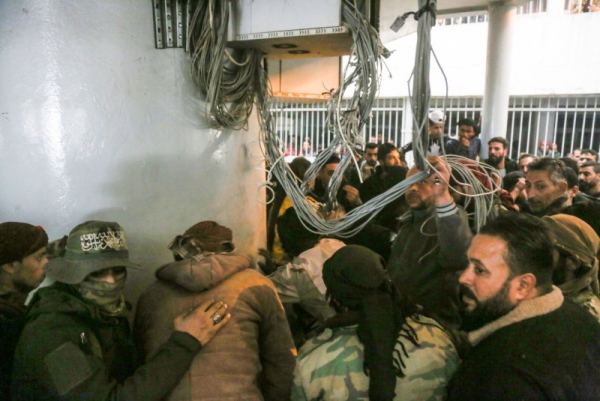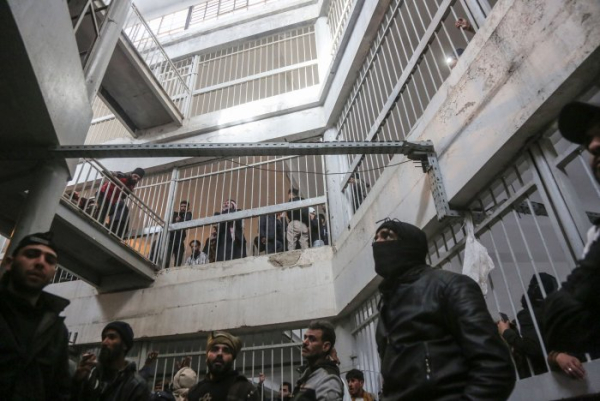
1 of 5 | People gather at the Saydnaya prison in Damascus, Syria, looking for loved ones on Tuesday. The prison was home for some of the worst atrocities of ousted president Bashar al-Assad’s rule. Photo by Asaad al-Asaad/UPI | License Photo
The commander of Syria’s rebels who overthrew the regime of President Bashar Assad, Ahmad Sharaa, said Wednesday that those involved in torturing and killing thousands of detainees will not be pardoned.
Meanwhile, a great number of them, including missing U.S. journalist Austin Tice, remain unaccounted for. Advertisement
Sharaa, better known as Abou Mohammed al Jolani, who heads the Islamist “Hayat Tahrir al-Sham, or HTS, said “we will not pardon those involved in torturing the detainees and liquidating them.”
He said in a statement posted on the Syrian state-run TV’s Telegram channel that they will be hunted down in Syria and called on “countries to hand over those criminals who fled [to them] so as to achieve justice.”
His comments came three days after the opposition forces, which launched lightning attacks and captured the main cities of Aleppo, Hama and Homs, reached Damascus, prompting Assad to flee and seek refuge in Russia. Advertisement
The fall of Assad revealed a shocking reality about tens of thousands of detainees when rebel forces stormed his regime-run jails in Damascus and other Syrian regions and freed them.
Anxious and desperate relatives were seen rushing to the most notorious Sednaya prison on the outskirts of Damascus, searching for their loved ones who disappeared for long years after having been arrested by Assad’s security and intelligence services, many for no clear reasons.
Freed detainees, speaking to Al Jazeera and Al Arabia TV stations, revealed the horror they faced during their detention, including widespread brutal abuses and torture.
Raed al-Saleh, the director of Syria’s Civil Defence organization known as the White Helmets, described the Sednaya prison as “a human slaughterhouse,” telling al Jazeera on Monday that “rescuers saw bodies in ovens” and daily executions were taking place in the complex.
Shocking photos of dozens of bodies found in Harasta Hospital in the Damascus countryside have been circulated by activists on social media, who said that they belonged to prisoners from the Sednaya prison who were executed before Assad’s ouster.
The fate and whereabouts of many who disappeared remained unknown amid rumors of secret underground cells at Sednaya and other secret prisons in unknown locations. Advertisement
Among them was U.S journalist Austin Tice, who went missing in Syria in 2012 while covering the Syria war that broke out a year earlier. He was seen in a video released shortly after his disappearance surrounded by gunmen.
Tice’s parents, Debra and Marc Tice, said in an interview with NBC Nightly News with Lester Holt on Monday that they received information before Assad was toppled that their son is still alive and well cared for, but they did not know who was holding him.
The State Department has asserted that he was being held by the Syrian regime, an accusation strongly denied by Assad’s government.
According to NBC News, U.S. Special Envoy for Hostage Affairs Roger Carstens is in Beirut, as part of efforts to bring Austin Tice home.
The Syrian Network for Human Rights called Wednesday on Russia to extradite Assad for trial in Syria for committing crimes against humanity and war crimes against the Syrian people.
The human rights group said in a statement posted on its website that the ousted President, who was granted asylum in Russia, is accused of killing “at least 202,000 Syrian civilians, including 15,000 who died under torture, of forcibly disappearing 96,000 others, and of displacing approximately 13 million more citizens.” Advertisement
It also referred to “numerous other heinous violations, including the use of chemical weapons.”
The group said Russian President Vladimir Putin’s decision to grant Assad and his family asylum in Russia on “humanitarian grounds” appears to be based “purely on political considerations and does not align with international legal standards.”
It called on Moscow to reconsider its asylum decision and extradite Assad “to the custody of the new Syrian authorities to face a fair trial in Syria.”
Pictures and videos also circulated Wednesday on social media that showed rebels standing next to the gravesite of Bashar Assad’s father, Hafez, which they set on fire in the family’s hometown village of Qardaha in the western Syrian Latakia province. Hafez Assad ruled the country with an iron fist for almost 30 years.
Separately in Damascus, the “Military Operations Management,” which includes the opposition armed forces, lifted a night curfew it had imposed in Damascus and the surrounding areas, calling on residents to return to their jobs.
Mohammed al Jalali, the former Syrian Prime Minister under Assad, said the situation in Damascus is “stable now,” adding that himself and members of his government were not under house arrest.
Al Jalali told Al Arabia TV that he was not able to reach the defense and interior ministers, while the transportation minister left the country. He added that he tried to contact Assad early Sunday when the rebels were entering Damascus but “he did not reply.” Advertisement
The overthrow of Assad on Sunday, which came after 13 years of a bloody civil war in Syria, marked the end of 50 years of Syrian Baath Party-Assad family rule that left the country in disastrous condition.
Syrians search Saydnaya prison in Damascus

Syrians gather at the Saydnaya prison in Damascus to look for loved ones on December 10, 2024. Photo by Asaad al-Asaad/UPI | License Photo